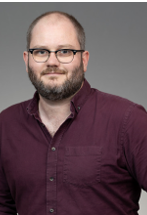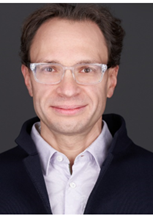Congratulations “Discovering the Future Grant” 2023 Awardees
We are pleased to announce the first three awardees for our Discovering the Future Grant program. Twenty-three competitive applications were submitted in response to the request for proposals and we thank all those members of the Penn faculty who submitted. We congratulate the following two awardees of grants from this program:
Intracellular protein editing

George M. Burslem
Assistant Professor
Department of Biochemistry and Biophysics (Biochem)
Perelman School of Medicine
Abstract: Our ability to study, and therefore understand, the roles of proteins within complex biological systems is hampered by a lack of tools, especially since we are largely limited to genetically encodable tools or small molecule inhibitors. In this proposal, we outline a novel approach we have developed and termed “intracellular protein editing” – a new technology to incorporate PTMs and un-natural functionality, into the primary sequence of proteins, within mammalian cells. This technology combines split intein-based fusion proteins and genetic code expansion to enable the rapid installation of PTMs and other useful unnatural amino acids, such as biotin, fluorophores or photo-crosslinkers, into a user-defined site. This approach has allowed us to validate our protein editing method by immunoblotting, pulldowns, and microscopy. We have shown that our protein editing method is minimally disruptive, rapid, near traceless, and can be easily multiplexed to incorporate a variety of useful labels. The concept of intracellular protein editing is original and exciting but currently lacks the evidence to move toward acceptance in the field, this Discovering the Future grant will enable us to realize the true potential of this approach and therefore introduce a new paradigm for the study and modulation of protein function.
Studying language evolution with GPT3: a new frontier

Joshua B. Plotkin
Walter H. and Leonore C. Annenberg Professor of the Natural Sciences
Department of Biology (BIOL)
School of Arts and Sciences
Abstract: Language enables all of humanity’s social and cultural sophistication. Understanding the structure and development of language is tantamount to understanding what distinguishes us from other species. We seek to reveal a new frontier in the study of language and communication by combining expertise from linguistics with evolutionary theory and new tools from machine learning. ChatGPT has captured everyone’s attention, from the lay public to specialized scientists. The underlying “large language models” are solving famously hard problems across science, such as predicting protein structure, better than the best domain-specific methods. And yet the study of human language itself has not yet capitalized on large language models. We propose a research project to reveal the power of GPT4 for inferring the forces that constrain language production, variation, and change. Our approach is made possible only through collaboration — between a PI in Biology and co-PI in Linguistics — and by leveraging the Philadelphia Neighborhood Corpus, the world’s largest dataset of speech measurements from speakers born over the course of a century.